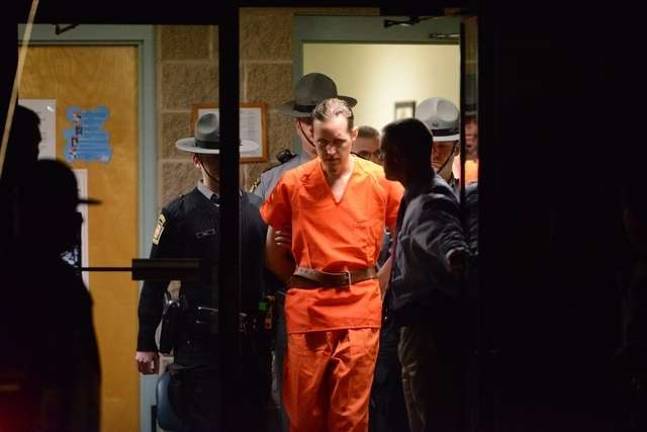What Eric Frein told investigators upon his capture

By Marilyn Rosenthal
MILFORD — Eric Frein was led into the courtroom Tuesday dressed in a navy blue suit, a light blue shirt, and a navy striped tie. He looked almost like a banker.
In video shown to the jury, he was in handcuffs and foot irons.
The opening scenes of the three-hour video, taken immediately after his capture on Oct. 30, 2014, showed the shackled Frein being led into the interrogation room at the Blooming Grove state police barracks, the scene 48 days earlier of the shooting ambush that killed Corporal Bryon K. Dickson II and critically injured Trooper Alex T. Douglass.
Unlike the composed Frein seen so far in the courtroom, the Frein in the video appears shaken. Crouched in his chair he looks almost emaciated. His bruised face is streaked with dried blood.
The officers leave him alone for a long time. The frame never changes. It just shows Frein.
He looks around the room. He looks up, he looks down. He rocks slightly back and forth.
Eventually Cpl. Benjamin Clark and Trooper Michael Mulvey enter the room. Clark removes Frein's handcuffs. He still has one ankle iron on.
"Thank you," Frein says.
Clark offers to wipe his bloody bruises, and he very gently does so.
"Anywhere else you hurt?," he asks.
"No," says Frein.
The interrogation begins in earnest. The quality of the audio was very poor. Judge Gregory Chelak instructed the jury to deal with it as best they could.
Defense Attorney Michael Weinstein asked the prosecution if a transcript of the interrogation was ever made. It wasn't.
A master of interrogationClark showed a master of interrogation at work. He deftly switches from one rhetorical strategy to another, lowering his voice and moving physically closer to Frein and he closes in on a confession. Several times Clark actually whispers and puts his hand on Frein's shoulder.
Buddies: Clark tries to befriend Frein, to get him to relax.
"Can we get you a sandwich or coffee?" Clark asks. "How about a cigarette?"
Frein, a chain smoker, is taken by this.
Clark advises Frein of his rights, but Frein does not sign the release.
"We will talk about guns, but not any crime," Clark says.
Praise: Mulvey uses positive reinforcement.
"I'm gonna be happy to call your parents tonight," he tells Frein. "Your parents are wonderful. Your dad — he's a piece of work. Very intelligent."
Later on he tells Frein, "You are very intelligent."
Appeal to ego: "Do you know you are famous?" Clark asks. "You have been on the front page of every newspaper in the country. You're the number two fugitive in the country on the FBI list."
"Number one!" Frein responds.
Blame the media: "You know what the media has?" Clark asks Frein. "A-G-E-N-D-A! They have an agenda. You have an opportunity to define yourself and tell us what happened."
"Don't let ABC and CBS define you," says Clark.
Frein, looking clinically depressed, says, "They already did!"
Power of suggestion: "You feel terrible. I can see it," Clark says. "Cpl. Dickson wasn't really your target. You just shot him the second time to make him stop yelling. What was the reason you shot Douglass and not the woman at the barracks? Was it because she was not in uniform?"
No, says Frein.
Clark continues: "I think you regretted it while you were running away."
He says: "We will tell Mrs. Dickson what you said, that you feel sorry, you feel terrible."
Man to man: Clark says at least five times: "Tell us why you did it. Man to man — just tell us."
He also repeatedly says, "I want to know as a person, as a father, "
Guilt: "What is kids' favorite word — why," says Clari. "Why won't Daddy come home tonight? Why did that man..." His voice trails off.
"Just tell us why you did it," he urges Frein. "You are holding it inside. Once you tell us, it's going to go away."
Appeal to good nature: "Help me help someone else," Clark implores Frein. "If I could understand (why) and prevent someone else from doing this, some good can come out of this."
For the rest of the interview, Frein says, "All I can say is I'm sorry."
"Thank God nobody else got hurt," says Clark.
Frein crossed himself.
The video revealed that Frein felt like a failure, that he got thrown out of college, that he lied to his parents about having a job.
Mulvey asks, "Did you want to get caught?"
Frein, tearing up, says, "I was guilty — guilty of everything."
Then he asks, "Are you guys going to submit what I said?"
To which Cpl. Clark responds, "It is what it is."